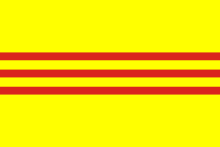
There were some in South Vietnam who wished to force Communist rule on their own people. But their progress was slight. Their hope of success was dim. Then, little more than six years ago, North Vietnam decided on conquest. ~ Lyndon B. Johnson
South Vietnam, officially the Republic of Vietnam, was a state governing the southern half of Vietnam from 1955 to 1975. It received international recognition in 1949 as the "State of Vietnam" (1949–55), and later as the "Republic of Vietnam" (1955–75). Its capital was Saigon.
Quotes
- There were some in South Vietnam who wished to force Communist rule on their own people. But their progress was slight. Their hope of success was dim. Then, little more than six years ago, North Vietnam decided on conquest. And from that day to this, soldiers and supplies have moved from North to South in a swelling stream that is swallowing the remnants of revolution in aggression. As the assault mounted, our choice gradually became clear. We could leave, abandoning South Vietnam to its attackers and to certain conquest, or we could stay and fight beside the people of South Vietnam.
- Lyndon B. Johnson, State of the Union Address (12 January 1966)
- I’m sure the ease with which bare-footed Vietcong marched into Saigon in 1975 now strengthens Pyongyang’s conviction that the “Yankee colony” will not last long after the colonisers pull out. In South Korea, meanwhile, conservatives are now loudly invoking the story of South Vietnam’s demise. They say, “There too you had a richer, freer state, and it fell only a few years after US troops pulled out. Let’s not make the same mistake”. They point worriedly to President Moon Jae-in’s own remark that he felt “delight” when predictions of US defeat in Vietnam came true.
- Brian Reynolds Myers, interview with The Conversation (September 2017)
- The deeply rooted religious divisions in South Vietnam were reflected in yesterday's military moves in Saigon against the Government of Premier Nguyen Khanh.
There were other factors, too — rivalry among generals and between civilian politicians and the military. But religious divisions have long been among the most troublesome in the war‐torn country.
They were sharpened in recent years under the rule of the late President Ngo Dinh Diem, when an essentially authoritarian regime became identified in the minds of many South Vietnamese as a Roman Catholic authoritarian regime.
About 10 per cent of the 14.5 million South Vietnamese are Catholics. Ten or 11 million consider themselves Buddhists, but only about half are Buddha worshipers. The rest are more likely to be ancestor‐worshipers.
- In the North, many Vietnamese Catholics led by their priests had fought during the war on the side of the French. Fearing retaliation by the Vietminh, they fled to the South when the war ended. In the South, the United States sought a leader for the new government who was both anti‐French and anti‐Communist. It selected Ngo Dinh Diem, who had an enviable record as a young civil servant.
- Mr. Diem was a devout Catholic. He returned to a shattered country, with little support outside of a political party operated by his own family. He was profoundly suspicious of many elements of the population.
In this situation, hundreds of thousands of Catholic refugees were a boon to him. He quickly resettled them—one of the foremost achievements of his regime—and he gave them special privileges. This special relationship was to sharpen feelings of religious discontent in the country. Mr. Diem, a Catholic from the central region, distrusted Vietnamese from the southern part of the country and was suspicious of Buddhists.
- The enemy had achieved in South Vietnam neither military nor psychological victory. For the South Vietnamese the Tet offensive served as a unifying catalyst, a Pearl Harbor. Had it been the same for the American people, had President Johnson discerned the same support behind him that Thieu did behind him, and had he acted with forcefulness, the enemy could have been induced to engage in serious and meaningful negotiations. Unfortunately, the enemy scored in the United States the psychological victory that eluded him in Vietnam, so influencing President Johnson and his civilian advisors that they ignored the maxim that when the enemy is hurting, you don't diminish the pressure, you increase it.
- General William Westmoreland, in his memoirs A Soldier Reports (1976), p. 334.
External links

This article is issued from
Wikiquote.
The text is licensed under Creative
Commons - Attribution - Sharealike.
Additional terms may apply for the media files.